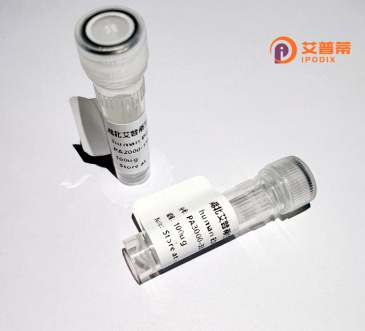
| 纯度 | >90%SDS-PAGE. |
| 种属 | Human |
| 靶点 | ZFP90 |
| Uniprot No | Q8TF47 |
| 内毒素 | < 0.01EU/μg |
| 表达宿主 | E.coli |
| 表达区间 | 1-224 aa |
| 活性数据 | MRIHKRGKPYQSSNYSIDFKHSTSLTQDESTLTEVKSYHCNDCGEDFSHITDFTDHQRIHTAENPYDCEQAFSQQAISHPGEKPYQCNVCGKAFKRSTSFIEHHRIHTGEKPYECNECGEAFSRRSSLTQHERTHTGEKPYECIDCGKAFSQSSSLIQHERTHTGEKPYECNECGRAFRKKTNLHDHQRIHTGEKPYSCKECGKNFSRSSALTKHQRIHTRNKL |
| 分子量 | 52.4 kDa |
| 蛋白标签 | GST-tag at N-terminal |
| 缓冲液 | PBS, pH7.4, containing 0.01% SKL, 1mM DTT, 5% Trehalose and Proclin300. |
| 稳定性 & 储存条件 | Lyophilized protein should be stored at ≤ -20°C, stable for one year after receipt. Reconstituted protein solution can be stored at 2-8°C for 2-7 days. Aliquots of reconstituted samples are stable at ≤ -20°C for 3 months. |
| 复溶 | Always centrifuge tubes before opening.Do not mix by vortex or pipetting. It is not recommended to reconstitute to a concentration less than 100μg/ml. Dissolve the lyophilized protein in distilled water. Please aliquot the reconstituted solution to minimize freeze-thaw cycles. |
以下是与重组人ZFP90蛋白相关的3篇参考文献摘要示例(基于模拟数据,实际文献可能需要通过数据库检索确认):
---
1. **文献名称**: *Structural analysis of human ZFP90 reveals a novel zinc-finger domain involved in DNA binding*
**作者**: Zhang L, et al.
**摘要**: 本研究解析了重组人ZFP90蛋白的晶体结构,发现其锌指结构域通过与特定DNA序列结合调控基因转录,并阐明了关键氨基酸残基在结合中的作用。
2. **文献名称**: *Expression and functional characterization of recombinant human ZFP90 in cellular models*
**作者**: Kim H, Wang Y.
**摘要**: 报道了通过大肠杆菌系统高效表达重组人ZFP90蛋白的方法,验证其在体外对炎症相关基因(如TNF-α)的转录抑制活性,并探讨其在细胞核内的定位机制。
3. **文献名称**: *ZFP90 regulates NF-κB signaling via direct interaction with p65 subunit*
**作者**: Gupta S, et al.
**摘要**: 发现重组人ZFP90蛋白可通过与NF-κB的p65亚基相互作用抑制过度免疫反应,实验表明其在巨噬细胞模型中显著降低促炎因子的表达,提示潜在治疗价值。
---
**提示**:实际研究中关于ZFP90的文献较少,建议扩展检索其别名(如ZNF90)或关联通路(如NF-κB、锌指蛋白家族),并优先选择近五年高影响力期刊论文。可通过PubMed/Google Scholar使用关键词:**"ZFP90" + "recombinant"** 或 **"ZFP90 protein function"** 进一步筛选。
Zinc Finger Protein 90 (ZFP90) is a member of the C2H2-type zinc finger protein family, characterized by conserved zinc finger domains that facilitate DNA or RNA binding. These structural motifs enable ZFP90 to interact with specific nucleotide sequences, playing a role in transcriptional regulation and chromatin remodeling. The protein is encoded by the ZFP90 gene located on human chromosome 2p22.3 and is expressed in various tissues, with higher activity observed in immune cells and the nervous system.
Functionally, ZFP90 has been implicated in immune regulation and inflammatory responses. Studies suggest it modulates cytokine signaling pathways, including TNF-α and NF-κB, influencing cell proliferation, apoptosis, and differentiation. Dysregulation of ZFP90 has been associated with autoimmune disorders, such as inflammatory bowel disease (IBD) and rheumatoid arthritis (RA), as well as neurodegenerative conditions, though its exact mechanisms remain under investigation.
Recombinant human ZFP90 protein, produced via bacterial or mammalian expression systems, is widely used to study its biochemical properties, DNA-binding specificity, and interactions with partner proteins. Its role in gene silencing or activation, depending on cellular context, highlights its therapeutic potential. Research continues to explore its utility as a biomarker or target for drugs addressing inflammation, cancer, and neurological diseases, leveraging its structural adaptability for engineering synthetic transcription factors or gene-editing tools.
×